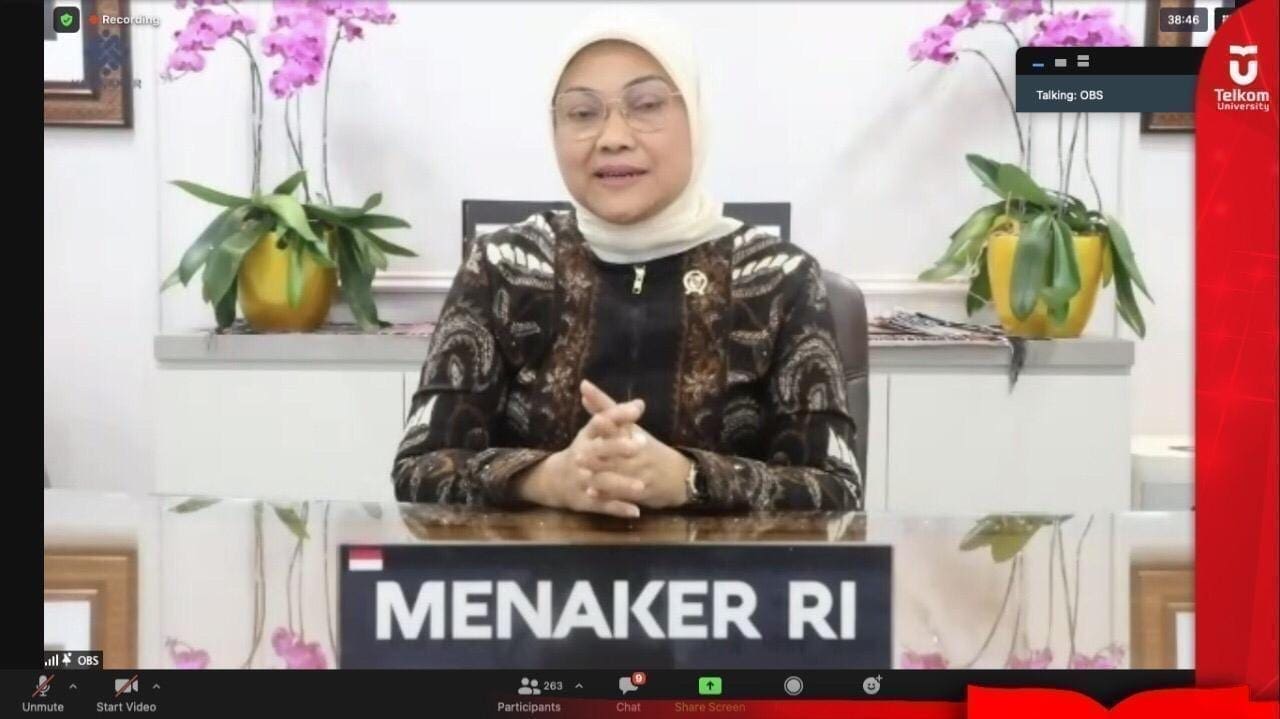 BANDUNG, Telkom University – Telkom University through the P1 Professional Certification Institute (LSP) held a seminar with the theme “The Role of Critical Occupations List (COL) in Fulfilling Superior HR in Indonesia”. This activity is held online through the ZOOM Meeting application on Thursday (18/03).
BANDUNG, Telkom University – Telkom University through the P1 Professional Certification Institute (LSP) held a seminar with the theme “The Role of Critical Occupations List (COL) in Fulfilling Superior HR in Indonesia”. This activity is held online through the ZOOM Meeting application on Thursday (18/03).
Prof. Dr. Adiwijaya as the Rector of Telkom University in his speech said that Telkom University focuses on creating superior human resources so that additional provisions are needed to increase capabilities.
“The Indonesian human resources development program is following the president’s vision and one of the media in developing existing human resources is through certification,” he said.
Prof. Dr, Adiwijaya also added that there is a demographic bonus that is predicted to occur in 2020-2030 and the abundance of the productive workforce in Indonesia must be utilized properly so that it can support national economic development and growth. Currently, we have entered the demographic bonus period and must face the Covid-19 Pandemic simultaneously.
“The Covid-19 pandemic creates demographic disruption, this is a challenge and Telkom University must be able to answer these challenges. Telkom University has a desire and responsibility, wants to see the human resources produced can create the future, “he said.
Dr. Hj. Ida Fauziyah, M.Sc., as the Minister of Manpower of the Republic of Indonesia attended as the Keynote Speaker. He explained that currently, the industrial world is facing digital disruption.
“Many types of jobs are now based on technology and many traditional jobs will be replaced. The Covid-19 pandemic has accelerated the impact of this disruption, especially in the use of technology, “he said.
The profile and skills needed in the future continue to grow, one of which is by adapting best practices according to current needs, so that it should be a priority. The Ministry of Manpower has made several efforts, one of which is providing qualified training and certification.
“I appreciate the event this morning and this is a real collaboration between the Government, Educational Institutions, and LSP. It was conveyed that this LSP has a very important role in organizing training and certification. I am optimistic and confident that the existing LSP is ready to support and synergize more in answering the Critical Occupations List. I hope that this Critical Occupations List can be carried out regularly and periodically in Indonesia. “
In this activity, the speaker also presented Kunjung M Advisor, S.H .. M.H., as the Chairman of BNSP. He explained that BNSP is an independent institution formed to carry out professional and work competency certification and in 2020 the Coordinating Ministry for Economic Affairs in collaboration with the World Bank (World Bank) created a skills monitoring system that aligns education and skills programs to the demands of the business world and the industrial world. The steps taken from the government system are the Critical Occupations List (COL).
The National System of Professional Certification is an arrangement of linkages for components of professional certification which includes the establishment of a certification agency for certification agency licenses, the implementation of certification, the normalization of certification for the development of a competency certification information system, and a synergic and harmonious quality assurance certification to achieving the objectives of implementing the national work competency certification Meanwhile, work competency certification, namely the process of providing competency certification which is carried out systematically and effectively through a competency test that refers to the Indonesian National Work Competency Standards, National Standards and/or Special Standards. A competency certificate is a legal product that becomes legitimate (proof of recognition) of a person’s ability to do a certain job.
“The national system of professional certification and work competency certification aims to provide examples, guidelines, and references for the implementation of professional competency certification in all sectors and business fields.”
Bonadio Aldo Tobing as the BNSP Commissioner was also present as a speaker. He explained the Critical Occupations List as one of the steps in developing superior human resources.
“There are several specific types of work included in COL which represent various sectors such as manufacturing, telecommunications and IT, accommodation and food services, construction, and other professional scientific services. COL can be used to formulate education policy and help policymakers to determine investment program training, adjusting incentives for apprenticeship programs and other skills, “he said.
The impact of the imbalance of skills in the industry or company, namely high costs, low income, reducing competitiveness below performance capacity should not be prolonged and limited investment. The role of COL in supporting the fulfillment of superior human resources, namely link, and match for education and training and industry, development of competency standards and curriculum, guidance to job seekers regarding jobs that are still short on work, development of competency certification schemes, providing incentives for vocational training and availability of quantitative resources.
“There are three pillars of human resource development, namely competency standards, competency-based education and training programs, and competency certification. So that in today’s industry or companies, the competition is not through diplomas but skills. “
Bonadio Aldo Tobing also explained the work steps of the Occupational Map, namely identification of competency standards, identification of competency-based training and education modules and the readiness of competency-based education and training institutions, identification of the commitment of Industrial Associations and Professional Associations in developing competency certification, developing certification schemes, developing LSP and implementation of certification.
“With this occupation map, it is hoped that it will be able to accelerate competency certification in the Critical Occupations List in fulfilling Superior HR in Indonesia.”
